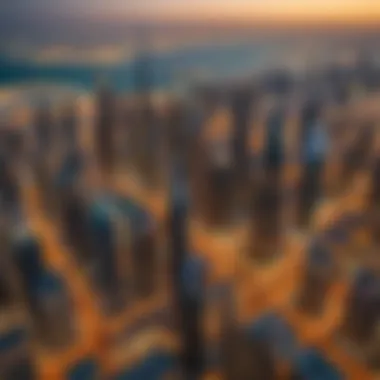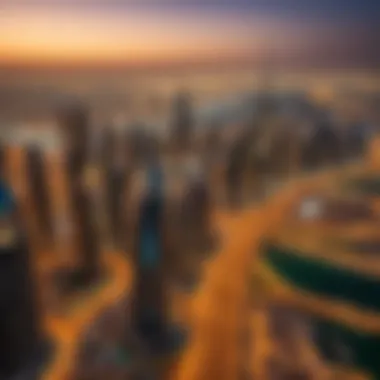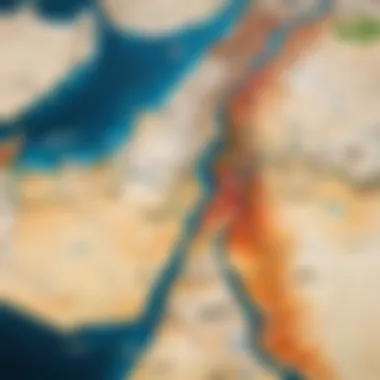Dubai's Geographical Identity in the UAE's Context


Intro
Dubai stands as a beacon of modernity and tradition, nestled in the heart of the United Arab Emirates. Its geographical identity is not just defined by its skyline, but deeply intertwined with its national context, history, and burgeoning global significance. Understanding this multifaceted identity requires an exploration into various dimensions—from the unique cultural markers to the socio-economic factors that shape this impressive city.
Diving into the historical fabric of Dubai provides clarity on its rapid development and evolving role in the region. The UAE's formation in 1971 marked a pivotal change in governance and unity among the emirates. Dubai emerged from its modest beginnings as a trading post to becoming a lively hub for commerce and tourism. The strategic positioning along trade routes has allowed it to pivot advantageously in the global market.
In assessing the intricacies of Dubai, several aspects warrant attention, especially its urban development, cultural landscape, and significant role in international relations. These factors coalesce to portray a city that is consistently redefining itself while managing to maintain an identity that resonates with both its origins and its aspirations.
Popular Destinations
The allure of Dubai extends beyond its iconic architecture. The city is home to unique destinations that embody its cultural and historical essence.
- Burj Khalifa: The tallest building in the world offers breathtaking panoramic views.
- The Dubai Mall: A shopping experience unlike any other, featuring attractions like an indoor ice rink and an aquarium.
- Old Dubai: This area provides a glimpse into the city’s past with its traditional souks and heritage sites.
- Palm Jumeirah: An engineering marvel, this man-made island is known for luxury living, hotels, and beach clubs.
Unique Places for Exotic Travel
Dubai's blend of modern conveniences and rich history creates an exciting atmosphere for travelers. Visitors can experience the luxury of international brands while exploring local cuisine and heritage.
Comfortable Places for Family Holidays
Family-oriented attractions are plentiful in Dubai. Places such as Dubai Parks and Resorts and Legoland Dubai ensure that visitors of all ages feel welcomed and entertained. Moreover, beaches such as Jumeirah Beach provide safe and enjoyable spaces for families to relax.
Preparing for the Trip
When planning a visit to Dubai, it's crucial to have a comprehensive travel strategy.
Tips for Choosing a Route
Choosing flight routes and accommodation should consider convenience and accessibility. Understanding transportation options upon arrival can greatly enhance the travel experience.
- Look for direct flights to minimize travel time.
- Consider staying in areas like Downtown Dubai for easy access to major attractions.
How to Pack: Useful Tips
Packing effectively is essential for a comfortable stay. The climate in Dubai can be quite hot, so selecting the right clothing is crucial.
- Lightweight, breathable fabrics are advisable.
- Don't forget sunscreen and formal attire if planning to visit fine dining restaurants or events.
Preamble to Dubai
Understanding Dubai involves more than simply recognizing it as a global city. Its geographical context plays a significant role in shaping its identity. This section discusses Dubai’s locational advantages and how they contribute to its growth and international prominence. The insights shared will be essential for grasping why Dubai stands out not just within the United Arab Emirates, but also on the global stage.
Defining Dubai's Location
Dubai is situated on the southeast coast of the Persian Gulf, making it a pivotal point for trade and commerce in the region. The city lies within the Arabian Peninsula, bordered by the emirate of Abu Dhabi to the south, Sharjah to the northeast, and the Arabian Gulf to the west.
The strategic location serves as a gateway between East and West. Its geographical coordinates, approximately 25.276987° N latitude and 55.296249° E longitude, place it in a favorable position for international trade routes. Additionally, the flat terrain helps facilitate urban sprawl and infrastructure development.
Dubai’s natural harbor provides easy access for shipping and logistics businesses. The city’s coastal position supports a thriving maritime sector and attracts a multitude of businesses linked to global markets.
Overview of the United Arab Emirates
The United Arab Emirates (UAE) is a federation composed of seven emirates, with Dubai being one of the most notable. Established in 1971, the UAE was formed from the union of Abu Dhabi, Dubai, Sharjah, Ajman, Umm Al-Quwain, Fujairah, and Ras Al Khaimah.
This compact federation leverages the strengths of each emirate, with Dubai emerging as a financial and tourism hub. The UAE’s strategic location enhances its profile as a business oasis in the Gulf region. The nation benefits from a stable government, modern infrastructure, and a diverse workforce.
Geographical Significance of Dubai
Understanding the geographical significance of Dubai is essential. It sheds light on how the city positions itself on the global map. This section examines vital aspects like Dubai's location, its strategic importance, and its role in international trade and travel.


Position within the Arabian Peninsula
Dubai is situated on the southeast coast of the Arabian Peninsula. It is bordered by the Persian Gulf to the northwest. This positioning provides Dubai with a favorable climate for trade and tourism. The desert surroundings and the coastal access make it unique among Gulf cities. Dubai serves as a natural harbor, enabling trade routes from Asia to Europe and beyond.
Historically, its geographic position has attracted many traders and merchants. This has created a rich tapestry of cultures and customs that influence the city today. The surrounding emirates and countries also benefit from Dubai's central position in the region. The accessibility of this city allows for a thriving economy based on commerce, tourism, and services.
Dubai is often called the 'Gateway to the East.' This title reflects its role as a bridge connecting various geographical and economic zones. Due to its strategic location, Dubai has emerged as a key player in global logistics.
Proximity to Major International Routes
One critical aspect of Dubai's geographical identity is its proximity to major international air and sea routes. Dubai International Airport is one of the busiest airports in the world. It serves as a major transit hub connecting the East and West. The strategic position ensures that flights to and from various continents are short and frequent.
In addition to air travel, Dubai has a robust maritime infrastructure. Major shipping routes pass through the waters of the Persian Gulf. This makes the Port of Jebel Ali one of the largest and busiest ports in the Middle East. The port offers access to Europe, Asia, and Africa, enhancing Dubai's stature in global trade.
"Dubai's connectivity through air and sea routes contributes to its status as a major international business hub."
The city has developed extensive roads and rail networks to support its position. These structures facilitate the movement of goods and services, supporting both local and international business. The geographical advantages translate into economic benefits, making it an attractive destination for investors and tourists.
In summary, the geographical significance of Dubai lies in its strategic location within the Arabian Peninsula and its proximity to important international routes. These elements not only enhance its global connectivity but also solidify its status as a pivotal economic and cultural center.
Historical Development of Dubai
Understanding the historical development of Dubai is crucial in framing its unique geographical identity. This section reveals how Dubai evolved from modest origins into a global hub, embodying cultural, social, and economic transformations. The historical narrative forms a backdrop for the current state of Dubai, connecting its rich past to its dynamic present.
Early Settlements and Trade
The roots of Dubai can be traced back to the early settlements that emerged along coastal trade routes. These settlements were not merely small communities; they served as vital nodes in a larger network of trade across the Arabian Peninsula and beyond. The proximity to the sea facilitated fishing and pearling while also attracting merchants from distant lands, creating a melting pot of cultures.
Trade played a significant role in shaping Dubai’s identity. Artifacts discovered in areas around Dubai indicate that commerce flourished as early as 3000 BC. The natural harbor provided strategic advantages, allowing for easier docking of dhows, the traditional sailing vessels. Over centuries, the city became known for its thriving market scene, which welcomed traders from Persia, India, and Africa.
Key elements from this early era include:
- Establishment of trade routes
- Cross-cultural interactions
- Development of a market economy
These aspects not only laid the foundation for Dubai's economic resilience but also contributed to its diverse cultural fabric. The influence of various cultures continues to shape Dubai’s social landscape today.
Formation of the United Arab Emirates
The formation of the United Arab Emirates (UAE) in 1971 marked a pivotal moment in the history of Dubai and the surrounding Emirates. Prior to this unification, Dubai was one of several sheikhdoms that operated independently. The discovery of oil in the late 1950s acted as a catalyst for change, transforming Dubai’s economic structure and leading to the need for cooperation among the emirates.
The unification brought together seven emirates: Abu Dhabi, Dubai, Sharjah, Ajman, Umm Al-Quwain, Fujairah, and Ras Al Khaimah. This coalition allowed for a more cohesive political and economic strategy, facilitating development and modernization across the region. Dubai was not just a participant; its leaders played a key role in shaping the new nation’s vision.
This event also ushered in rapid infrastructural development, educational advancements, and a robust legal framework. Underlining the benefits of this formation are:
- Increased political stability
- Economic diversification
- Enhanced international relations
Dubai’s transition from a small trading post to a shining symbol of modernity and progress within the UAE aligns closely with these developments. It highlights the city's significant role in the national context and its ongoing impact on the region’s identity.
"Dubai exemplifies how a small settlement can transform into a global metropolis through strategic vision and unity among diverse cultures and emirates."
Cultural Dynamics in Dubai
Dubai stands as a unique tapestry woven from threads of various cultural backgrounds and traditions. The city serves as a melting pot, embodying a blend of influences due to its diverse population. Exploring the cultural dynamics in Dubai is essential for understanding how its identity is shaped, both locally and internationally.
Influence of Diverse Populations
Dubai's population is one of the most diverse in the world. Roughly 90% of its residents are expatriates, hailing from various countries such as India, Pakistan, the Philippines, and Western nations. This diversity brings a rich array of cultural practices, religions, and languages, all coexisting within the city.
The presence of so many nationalities has created an environment where cultural exchange flourishes. For instance, festivals such as Diwali and Christmas are celebrated alongside Eid al-Fitr, reflecting the cohabitation of different cultural values. This multiculturalism impacts everyday life, from culinary offerings to art forms, making Dubai a vibrant hub of global culture.


Additionally, the influence of these diverse populations is evident in local businesses and service sectors, catering to international tastes while maintaining a distinct local flavor. Such adaptability not only enriches the cultural landscape but also positions Dubai as a prominent player in global commerce.
Local Traditions and Modern Identity
While Dubai is often recognized for its modern skyline and luxurious lifestyle, it retains a deep respect for its local traditions. Emirati culture permeates through daily life, showcasing the significance of customs in this fast-paced city.
Traditional practices such as falconry, camel racing, and crafts like weaving are integral to the national identity of the UAE. These traditions reflect the values of hospitality, family, and community, which are highly prized in Emirati society. The importance of storytelling and oral history also plays a key role in preserving the cultural heritage of the region.
However, as Dubai continues to evolve, it grapples with finding a balance between modernization and the preservation of its heritage. Cultural institutions such as the Dubai Museum and Al Fahidi Historical Neighborhood serve as reminders of the city's past while promoting education about Emirati identity to a global audience.
Dubai's Economic Landscape
Dubai's economic landscape serves as a pivotal focal point in its geographical identity and role within the United Arab Emirates. This region has evolved into a dynamic hub for commerce, standing out in tourism, trade, and real estate. Understanding this landscape is vital for comprehending how Dubai fits within the broader national context.
Tourism as a Major Industry
Tourism is a cornerstone of Dubai’s economy. The city attracts millions of visitors annually, drawn by its luxurious amenities, captivating architecture, and diverse cultural experiences. In 2019 alone, Dubai welcomed over 16 million tourists, a number that illustrates its global appeal. The Burj Khalifa, the Dubai Mall, and the Palm Jumeirah are just a few iconic attractions that entice tourists.
Investment in hospitality has been extensive. Numerous hotels, ranging from budget to luxury, cater to various traveler preferences. Leading hotels like the Burj Al Arab and Atlantis The Palm provide unique experiences that enhance Dubai’s attractiveness as a tourist destination.
Moreover, the tourism industry contributes significantly to the economy. It creates jobs, promotes local businesses, and drives demand for services. Local food industries, transportation, and leisure activities thrive due to tourist expenditure. With initiatives like Dubai Expo 2020, postponed to 2021 due to the pandemic, the city aims to showcase its culture and innovation, further establishing its reputation as a leading global tourism destination.
"Tourism is not just a source of revenue for Dubai, it is part of our identity, helping to connect cultures and promote understanding."
Real Estate and Infrastructure Development
Real estate and infrastructure development are integral components of Dubai's economic fabric. The city has witnessed unprecedented growth in this sector, leading to an impressive skyline characterized by towering skyscrapers and lavish developments. Notable projects include the Dubai Marina, Downtown Dubai, and the Expo 2020 site, exemplifying architectural innovation.
The government has implemented policies to stimulate investment in both residential and commercial real estate. This has led to a surge in property development. The growing expatriate population, coupled with the arrival of international businesses, has created high demand for housing and commercial spaces.
Consequently, Dubai's real estate market has attracted global investors due to its potential for high returns. There are several building projects that aim to support a growing population while also maintaining sustainability. For instance, developments focus on eco-friendly designs and smart technology integration, aligning with global standards.
In a city where the aim is often to surpass previous achievements, the economic landscape continues to evolve. The emphasis on innovation and diversity propels Dubai's stature as an economic powerhouse within the UAE.
Modern Political Context
Understanding the modern political context of Dubai is crucial for grasping its role within the United Arab Emirates. Dubai stands as an epitome of progressive governance in a nation where tradition and modernity interweave. The emirate functions under a unique political structure that reflects both local customs and contemporary global practices.
Dubai's Role in UAE Governance
Dubai plays a pivotal role in the governance of the United Arab Emirates. As one of the seven emirates, it houses strategic initiatives that influence national policy. The emirate has a distinct autonomous framework, allowing it to retain local authorities while aligning with national objectives. This dual governance structure enables Dubai to innovate at a rapid pace, particularly in economic development and social infrastructure.
- Sheikh Mohammed bin Rashid Al Maktoum leads the emirate as Vice President and Prime Minister of the UAE.
- Dubai's Executive Council oversees various development projects and economic strategies.
- The emirate's careful balance between maintaining cultural heritage and fostering a globalized economy has earned it a reputation as a hub of innovation and business.
This governance model promotes a unique blend of local tradition and modern administration, which allows Dubai to adapt swiftly to changing global dynamics without compromising its cultural roots.
International Relations and Trade Policies
Dubai's international relations are tailored to enhance its status as a global business center. The emirate engages in continuous dialogue with nations worldwide, establishing trade partnerships that are beneficial for its economic landscape.
- Free Trade Zones: Dubai has established numerous free trade zones that attract foreign direct investment. These zones foster an environment of business-friendly regulations, drawing in corporations from various sectors.
- Strategic Economic Partnerships: Agreements with countries across different continents enable Dubai to broaden its market access and explore new opportunities.
- Cultural Diplomacy: Through events like the Dubai Expo, the emirate showcases its commitment to international collaboration while promoting its cultural identity.
The dynamic approach to trade and international relations not only boosts economic growth in Dubai but also solidifies its position as a key player within the global market.
"Dubai exemplifies a modern nexus of trade and governance, intertwining its rich heritage with a progressive outlook."
Tourism Infrastructure in Dubai
Dubai’s tourism infrastructure plays a critical role in its identity and economy. The city attracts millions of visitors annually, and significant investment has gone into creating a robust system that supports this influx. The development of modern facilities, transportation networks, and services has transformed Dubai into a premier global travel destination.


Investment in tourism infrastructure has multiple benefits. It not only boosts the local economy but also enhances the quality of life for residents. Strong infrastructure leads to greater visitor satisfaction, encouraging repeat tourism and positive word of mouth. Moreover, it supports various sectors such as hospitality, transportation, and retail.
Accommodation and Hospitality
The accommodation sector in Dubai is diverse, catering to a wide range of visitors. From opulent five-star hotels like the Burj Al Arab to budget-friendly options, the city offers choices that fit various budgets and preferences. Developers have consistently constructed new hotels and renovated existing ones to meet the high standards of international travelers.
The hospitality industry in Dubai goes beyond mere lodging. Many hotels provide unique experiences, with top-notch dining, spa services, and leisure activities that reflect the cultural richness of the region. This enhances the overall visitor experience and reinforces Dubai’s reputation as a luxury destination.
- Five-Star Hotels: Offering world-class services and amenities.
- Boutique Hotels: Providing personalized experiences.
- Budget Accommodations: Ensuring accessibility for travelers on a budget.
The emphasis on customer service and innovation has made Dubai a leader in hospitality. Visitors often highlight the warmth of the local staff and their willingness to assist, which adds to the overall appeal of the city.
Cultural Attractions and Landmarks
Dubai is home to a variety of cultural attractions and landmarks that showcase its unique heritage. The city’s skyline, dominated by the Burj Khalifa, is a testament to its modernity and ambition. However, it also preserves traditional sites such as the Al Fahidi Historical Neighborhood, where tourists can explore its rich past.
- Burj Khalifa: The tallest building in the world, offering breathtaking views.
- Dubai Museum: Located in Al Fahidi Fort, detailing the city’s history.
- Dubai Opera: A hub for world-class performances and cultural events.
- Desert Safari: An experience that highlights the natural beauty surrounding Dubai.
These landmarks serve as vital points of interest that encourage tourism. They inform visitors about Dubai’s evolution from a small fishing village to a global metropolis. The integration of modern and traditional aspects draws diverse crowds, enhancing the city's global appeal.
"The juxtaposition of traditional culture and modern development in Dubai creates a unique experience that captivates visitors and shapes their understanding of the Emirati identity."
In summation, tourism infrastructure in Dubai is essential for sustaining its status as a top destination. With unparalleled accommodation options and captivating cultural attractions, the city continuously adapts to meet the needs of its visitors. Each aspect of its tourism infrastructure tells a part of Dubai's broader story within the UAE.
Future Prospects of Dubai
The future prospects of Dubai are fundamentally intertwined with its strategic objectives and the global landscape. As a city known for its rapid growth and transformation, Dubai continues to seek new avenues for development. This section will highlight several key elements shaping its future, including sustainability initiatives, technological advancements, and the overall impact on the city's identity and economy.
Sustainability Initiatives
Sustainability is a core focus for Dubai's development. With the growing concern regarding climate change, the city has taken substantial steps to incorporate environmental considerations into its future planning. One prominent project is the Dubai Clean Energy Strategy, aiming to generate 75% of the city's energy from clean sources by 2050. This ambitious goal involves extensive investments in solar and wind energy.
Further, Dubai is enhancing its public transportation system to reduce traffic congestion and emissions. The expansion of the Dubai Metro and the introduction of electric buses represent efforts to provide eco-friendly transit options for residents and tourists alike. These measures aim to solidify Dubai’s reputation as a leader in urban sustainability.
Moreover, environmental awareness campaigns are being launched to engage residents and businesses in sustainable practices, promoting recycling and conservation initiatives. Such programs are essential not just for the city's image but also for preserving its resources and enhancing the quality of life for its inhabitants.
"Dubai aims to become the city with the lowest carbon footprint in the world."
Technological Advancements in Urban Planning
Technological innovation plays a critical role in shaping Dubai's urban environment. The city embraces smart technologies that integrate artificial intelligence and data analytics into urban planning. This application aids in optimizing infrastructure and improving the efficiency of services provided to residents.
For instance, Dubai is implementing smart grids that enhance energy distribution and consumption monitoring. The use of sensors and connected devices allows for real-time data collection, enabling better decision-making and resource management. Additionally, the emphasis on smart buildings enhances energy efficiency and sustainability.
In the realm of public services, the Dubai Government's initiative for digital transformation aims to streamline governmental functions. This shift towards e-governance promises greater accessibility and efficiency for residents, reducing the bureaucratic burden for services like permits and licenses.
End
Summarizing Dubai's National Identity
Dubai's national identity is shaped by its rich history, diverse culture, and strategic geographic location. The blending of traditional values with modern enterprise marks its essence. The city acts as a bridge between East and West, facilitating trade and promoting cultural exchange.
Several elements contribute to this identity:
- Historical Settlements: Past trading routes established Dubai as a commercial center, enhancing its importance.
- Cultural Diversity: An expansive expatriate community adds to the vibrancy of local life, enriching cultural exchanges.
- Modern Infrastructure: Innovative architecture and urban planning reflect a forward-thinking mindset, aligning with global standards.
The Importance of Dubai within the UAE
Dubai plays a crucial role in the broader framework of the United Arab Emirates. Its influence extends beyond economic contributions to embrace social and cultural dimensions. Its development acts as a catalyst for growth in the entire nation, showcasing what can be achieved through vision and strategic planning.
Key aspects include:
- Economic Hub: Serving as a focal point for finance and trade, Dubai's economic activities significantly bolster the UAE’s GDP.
- Tourism Magnet: Attracting visitors from around the world, Dubai is key to the UAE's tourism strategy, creating jobs and opportunities.
- Cultural Ambassador: The city epitomizes the UAE's commitment to cultural heritage while embracing modernity.
Dubai's geographical identity thus encapsulates its historical roots and forward-looking ambitions. Its importance within the UAE resonates through its multifaceted contributions to culture, economy, and international ties.







